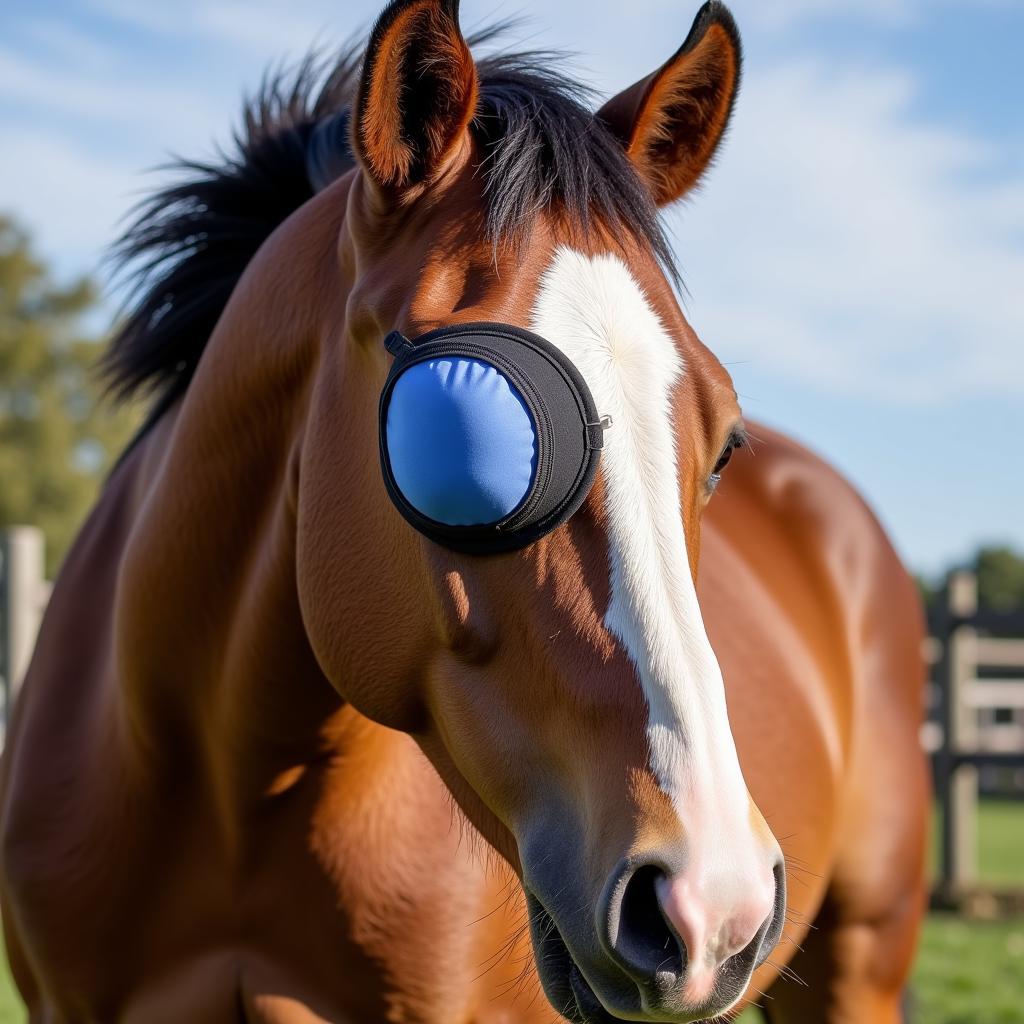A swollen eye on your horse can be alarming. Whether it’s a minor irritation or a sign of a more serious underlying condition, understanding How To Treat A Swollen Eye On A Horse is crucial for every horse owner. This article will provide you with a comprehensive guide to identifying the causes, treatments, and when to seek veterinary attention for equine eye issues.
Common Causes of Swollen Eyes in Horses
Several factors can contribute to eye swelling in horses. Identifying the underlying cause is essential for effective treatment. Some common culprits include:
- Trauma: A direct blow to the eye area, a scratch from a branch, or even dust and debris can cause swelling.
- Infection: Bacterial, viral, or fungal infections can lead to inflammation and swelling.
- Allergies: Similar to humans, horses can have allergic reactions to environmental factors like pollen, dust, or certain plants. This can manifest as swollen eyes. You can learn more about potential allergens by reading about horse nash.
- Foreign Bodies: Small particles like dirt, sand, or even insects can get lodged in the eye, causing irritation and swelling.
- Conjunctivitis: Also known as pink eye, conjunctivitis is inflammation of the conjunctiva, the membrane lining the eyelids and covering the white part of the eye.
- Uveitis: This is a more serious condition involving inflammation of the uvea, the middle layer of the eye. Uveitis can be caused by infection, trauma, or even systemic diseases.
- Lyme Disease: A tick-borne illness, Lyme disease can sometimes present with eye swelling in horses. Learn more about the symptoms of lymes disease in horses.
How to Treat a Swollen Eye: A Step-by-Step Guide
If you notice your horse has a swollen eye, the first step is to remain calm and assess the situation.
- Visual Inspection: Carefully examine the eye for any obvious foreign bodies, cuts, or discharges.
- Gentle Cleaning: If there’s visible debris, carefully flush the eye with sterile saline solution or clean, lukewarm water.
- Cold Compress: Applying a cold compress to the swollen area can help reduce inflammation. A clean cloth soaked in cold water will suffice.
- Contact Your Veterinarian: Even if the swelling seems minor, it’s always best to consult your veterinarian. They can diagnose the underlying cause and recommend the appropriate treatment.
“A timely diagnosis is critical in preventing further complications,” advises Dr. Emily Carter, DVM, an equine ophthalmologist with over 20 years of experience. “Don’t hesitate to contact your vet even if the swelling seems to improve slightly.”
When is it an Emergency?
While some cases of eye swelling can be managed with basic first aid and veterinary guidance, certain situations warrant immediate veterinary attention. These include:
- Severe Pain: If your horse is showing signs of significant pain, such as squinting, excessive tearing, or head shaking.
- Cloudiness or Change in Pupil Size: Any noticeable changes in the appearance of the eye, such as cloudiness or an unusual pupil size, should be addressed immediately.
- Protruding Eye: If the eye appears to be bulging out of the socket, this is a serious sign and requires immediate veterinary care.
- Loss of Vision: Any indication of vision loss necessitates urgent veterinary intervention.
 A horse wearing a protective eye patch after treatment for a swollen eye.
A horse wearing a protective eye patch after treatment for a swollen eye.
Preventing Eye Injuries in Horses
Prevention is always better than cure. Here are some steps you can take to minimize the risk of eye injuries in your horse:
- Safe Environment: Ensure your horse’s environment is free of hazards like sharp objects, protruding branches, and excessive dust.
- Fly Masks: Fly masks can offer valuable protection against insects and airborne debris.
- Regular Check-ups: Routine veterinary check-ups can help identify and address potential eye problems early on. You can learn more about eye related issues by reading about horse eye swelling.
Conclusion
Knowing how to treat a swollen eye on a horse is paramount to responsible horse ownership. By being vigilant and proactive, you can help ensure the health and well-being of your equine companion. Remember, early diagnosis and appropriate veterinary care are key to preventing long-term complications. You might want to learn more about managing long-term effects of Lyme disease, especially if your horse is diagnosed with this condition. You can find helpful information about lyme disease in horses…long term effects. Don’t delay seeking professional advice if you notice any abnormalities in your horse’s eyes. Effective treatment relies on a correct diagnosis. Ichthammol ointment can sometimes be used for certain conditions affecting horses; learn more about it at ichthammol ointment for horses.
FAQ
- Can I use human eye drops on my horse?
- How can I tell if my horse is in pain?
- What are the long-term consequences of untreated eye infections in horses?
- Are certain breeds of horses more prone to eye problems?
- How can I clean my horse’s eye without causing further irritation?
- What are the signs of uveitis in horses?
- Are there any home remedies for treating swollen eyes in horses?
When you need assistance, please contact us: Phone Number: 0772127271, Email: [email protected] Or visit us at: QGM2+WX2, Vị Trung, Vị Thuỷ, Hậu Giang, Việt Nam. We have a 24/7 customer service team.